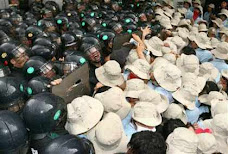
A six year-old in Laos lost his left eye in 2005 when he found a cluster bomb left from the Vietnam War. © 2005 Andrew McConnell/WpN.
Cluster Bomb Treaty Breaks New Ground
The Treaty Immediately Bans All Types of Cluster Munitions.
(Dublin, May 30, 2008) – The new cluster munitions treaty adopted in Dublin on May 30, 2008, will save thousands of lives for decades to come, with key treaty provisions stronger than even some of its staunchest supporters had expected, Human Rights Watch said today.Read more
US: Defeat at Clusters Parley
US Won Some Concessions on the Issue of “Interoperability”
(Dublin, May 28, 2008) – US efforts to undermine a new treaty banning cluster munitions met with significant defeat today at the final negotiations in Dublin, Human Rights Watch said.Read more
Cluster Bomb Treaty Breaks New Ground
(Dublin, May 30, 2008) – The new cluster munitions treaty adopted in Dublin on May 30, 2008, will save thousands of lives for decades to come, with key treaty provisions stronger than even some of its staunchest supporters had expected, Human Rights Watch said today.The treaty immediately bans all types of cluster munitions, rejecting initial attempts by some nations to negotiate exceptions for their own arsenals, as well as calls for a transition that would delay the ban for a decade or more. In addition to the prohibitions on use, production, stockpiling, and trade, the treaty also includes very strong provisions requiring states to provide assistance to victims and to clean up areas affected by cluster munitions. “This treaty will make the world a safer place for millions of people,” said Steve Goose, director of the Arms division at Human Rights Watch. “Cluster munitions have been tossed on the ash heap of history. No nation will ever be able to use them again without provoking the immediate revulsion and disapproval of most countries in the world.” Cluster munitions typically explode in the air and send dozens, even hundreds of tiny bomblets over an area the size of a football field. Used in urban areas, they invariably kill and injure civilians. Used in any circumstance, they can harm civilians even decades after the war is over, as “duds” on the ground act like landmines, exploding on contact. Both governments and non-governmental organizations campaigning for the treaty built consciously on the precedent set by the 1997 Antipersonnel Mine Ban Treaty. But in many ways, the Convention on Cluster Munitions goes farther, Human Rights Watch said. “This treaty bans not just some cluster munitions, but all cluster munitions,” Goose told the assembled delegates in his capacity as co-chair of the Cluster Munitions Coalition, a group of hundreds of NGOs supporting the ban. “It does not try to differentiate between good cluster munitions and bad cluster munitions, it bans them all. This is a convention with no exceptions. This is a convention with no delays. This can only be described as an extraordinary convention.” Human Rights Watch urged governments supporting the treaty to make all necessary preparations to sign the treaty in Oslo in December 2008. The treaty will go into effect after 30 nations have signed and ratified it. Several of the world’s biggest users or stockpilers of cluster munitions were not present at the Dublin talks, including the United States, Russia, China, India, Brazil, Pakistan, and Israel. But experience with the Mine Ban Treaty suggests that even non-signatories will ultimately feel bound by the ban on cluster munitions. Although the United States has still not signed the Mine Ban Treaty, for example, it has not used, exported, or produced any antipersonnel landmines since the treaty was negotiated 11 years ago. “The most important thing this treaty does is to stigmatize cluster munitions,” said Goose. “The stigma will grow and deepen over time, and ultimately make the use of cluster munitions unthinkable by anyone.” The new treaty’s sole disappointment came in Article 21, which is designed to provide legal protection for a signatory’s armed forces if another country uses cluster munitions during joint military operations. Human Rights Watch urged governments to make clear in official statements a “common understanding” that the treaty does not allow deliberate assistance for the use of cluster munitions during joint operations and does not allow non-signatories to stockpile cluster munitions on the territory of signatory states. The UK government has already indicated that it will ask the United States to remove its cluster munitions from UK territory within the eight-year deadline for stockpile destruction. The United States has not been present at the negotiations, but put intense, behind-the-scenes pressure on negotiating states to avoid inhibiting future US use of the banned weapon.
Article 21 of the treaty also includes a requirement that signatories actively discourage use by other states. More on Human Rights Watch's work on Cluster Munitions:http://www.hrw.org/doc/?t=arms_clusterbombs-----------
Please help support the research that made this bulletin possible. In orderto protect our objectivity, Human Rights Watch does not accept funding fromany government. We depend entirely on the generosity of people like you.To make a contribution, please visit http://hrw.kintera.org/donate3































No hay comentarios:
Publicar un comentario